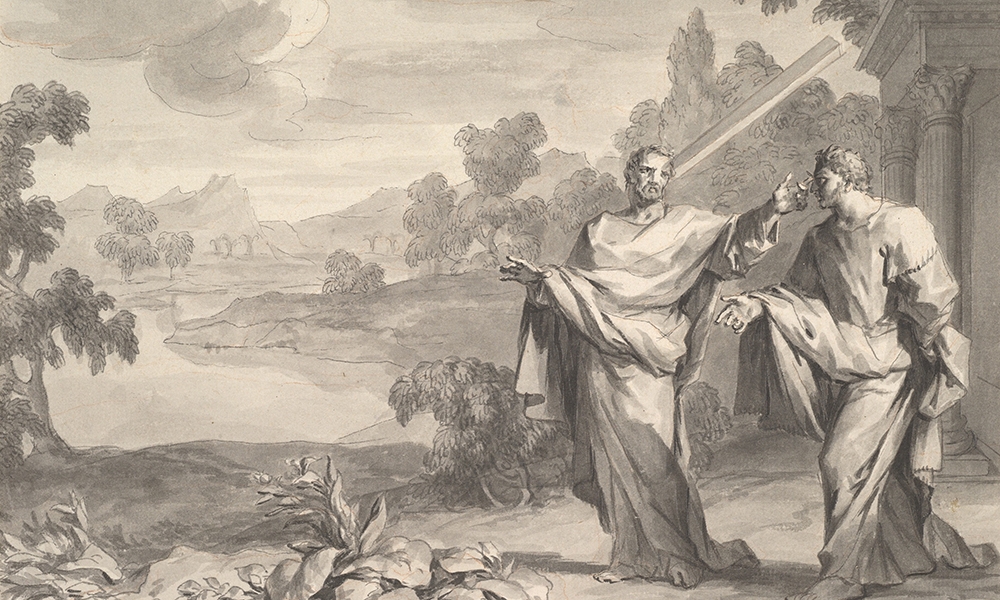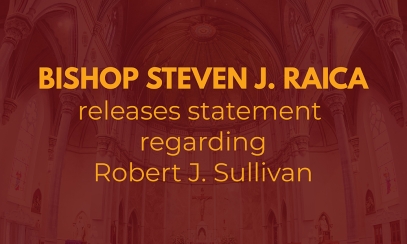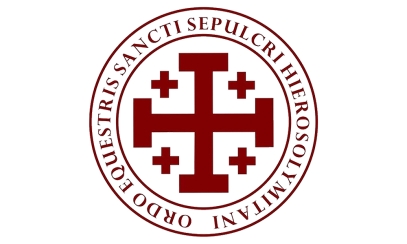
‘We must keep looking, listening, opening our hearts and minds’
On March 2, the bishop celebrated the Mass at St. Stephen the Martyr Catholic Chapel in Birmingham, marking the Eighth Sunday in Ordinary Time. The complete text of his homily follows herein.
On March 2, the bishop celebrated the Mass at St. Stephen the Martyr Catholic Chapel in Birmingham, marking the Eighth Sunday in Ordinary Time. The complete text of his homily follows herein.
My friends, today we are at a crossroads! Perhaps we could call it a “liturgical crossroads.” This coming Wednesday, we pivot our thoughts, words, and actions from Ordinary Time to Ash Wednesday, embarking on our Lenten season. What will we experience as we walk with Jesus for 40 days? It’s not for the weak or faint of heart! It requires a resolve and conviction that begins from the inside – right in the heart which is the very locus of truth, beauty, freedom, justice, and happiness. It can turn us upside down or inside out. Taking Lent seriously will not leave us where we are. It gives us a prolonged moment to look at our insecurities, our wounds, our doubts as we look to Christ Who gives us a definite direction, binds our wounds, forgives our sins, and offers us a greater certainty of a promising future. It is the beginning of another journey that doesn’t settle for the least or the minimum just to get by in our spiritual life but that wants us to begin a new life, awakening us to a new reality right before our eyes.
Of course, places around the world celebrate Carnevale these days, with famous ones in our part of the world in Mobile and New Orleans. Venice and Viareggio are famous places in Italy for celebration and Rio de Janeiro in Brazil. On Tuesday, we will have our immediate preparation with Mardi Gras or Fat Tuesday. For many of us Poles, it’s Pączki day! It’s a blowout day as it transitions to the austerity, soberness, and simplicity of our Lenten journey. Tuesday is the day we bury our “Alleluias” until the glory of the Easter Vigil and sing songs that remind us of converting our hearts, minds, and bodies to Christ.
Today, then, on this final Sunday before our Lenten season, we hear such time-honored quotable and memorable passages in the Gospel to inspire us to something more in our discipleship. Here are three of them:
“Can a blind person guide a blind person?”
In other words, who is at the heart of guiding your life. Who do you look to as a point of reference? “I was blind, but now I see.” We sing about an amazing grace, for the purpose of life, as I continue to reflect and learn, is not merely to have a job, grow a family, have fame or fortune. It is to become truly ourselves as part of God’s dream for us. Who will guide us in that journey? Whom do we allow ourselves to be guided by in helping us become truly ourselves as redeemed, free, and persons who live life abundantly, not reduced to our sins or the least we can be but truly full of life and joy with a taste and zest for all life and all of reality so that we can ultimately say – we have never seen anyone live like that before? I want that! I want to know who my leader is.
“No disciple is superior to the teacher; but when fully trained, every disciple will be like his teacher.”
In other words, the one who teaches is truly responsible for training the heart, not merely the brain, to long, to desire, to open up to God’s action in our lives. It is to take the mountains of knowledge and information and point out that this is the most important to learn about. It is to catch a glimpse of the passion and hope that lies in store.
A disciple is one who follows. In this case, one who follows a master (a life coach!)– a person who can teach us the method of forming our hearts to conform to that of the Master Christ Himself. It is a heart that yearns, a heart that loves, a heart that seeks the good of others. It is a heart that forgives, a heart that reconciles, a heart that sees that the greatest thing that can happen is to be reconciled to God and each other – to love as God loves as we heard last week; to see as God sees; to forgive as God forgives. That is a model that gives me hope – that doesn’t bring me down but lifts me up!
“Why do you notice the splinter in your brother’s eye, but do not perceive the wooden beam in your own? … Remove the wooden beam from your eye first; then you will see clearly to remove the splinter in your brother’s eye.”
It is easy to tell others what to believe, what to do. How easy it is to be righteous in condemning others without even knowing them! Our Lord’s method is quite different: look at yourself first to see the inconsistencies, the sins, the questionable behaviors that characterize your own life.
Through your words and actions are you furthering the Body of Christ or dividing it and tearing it down? Are my words honoring the Body of Christ or disfiguring it and causing wonder? I go through that examination of conscience frequently on this score and seek out the forgiveness that is offered in the sacrament of penance, seeking out the virtues that will honor the dignity of another who bears God’s image and likeness.
I often tell the story of a young collegian at a retreat some years ago who came up to me and said in all seriousness, “Msgr., I want to become a saint!” She had obviously met Christ along the way and was serious about her life. She didn’t look around to see the inconsistencies in the Church, the imperfections or sins of her leaders or other members. No, her focus was on herself and her relationship with Christ, with her destiny. I know we don’t have a perfect institution. I know it very well, but I do know that I have the certainty of my relationship with Jesus Christ – that I am called, that I am still a disciple, that I am redeemed, that my sins are forgiven, that I am nourished, and that I am called to be more than I can even imagine. Removing the beam in my eye takes effort because I want to compare myself with others rather than the hope and dream that God wants me to become. Yes, I want to become a saint, and it is not an easy task sometimes. There is much happiness and a lot of misunderstanding, increased suffering, intense joy, and moments of desolation.
Pope Francis talks about it in his writings pivoting on St. John Paul II’s clarion call: “Do not be afraid to set your sights higher, to allow yourselves to be loved and liberated by God. Do not be afraid to let yourselves be guided by the Holy Spirit. Holiness does not make you less human, since it is an encounter between your weakness and the power of God’s grace. For in the words of León Bloy, when all is said and done, ‘The only great tragedy in life, is not to become a saint.’” (Pope Francis, Ap. Ex., Gaudete et Exsultate)
Today, as we prepare for the great season of Lent, perhaps we can reflect on a few questions. Who teaches us about ourselves? Who helps to remove the blindness that keeps me from going toward the light? Who takes away the burdens that weigh me down and are an albatross on my life? Where does it start from? Should I merely struggle to try and get by or is there something or Someone Who can make me an even greater and better disciple of Jesus?
There are saints among us. Christ’s action, His grace has changed someone’s life. Christ is here and alive. We must keep looking, listening, opening our hearts and minds to where we are going. Teach us. Help us see. Take away the burdens weighing us down. “Thanks be to God Who gives us the victory through our Lord Jesus Christ!” (I Cor 15:57)



